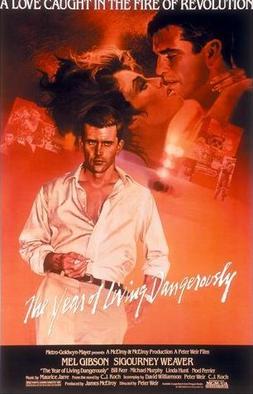“The Year of Living Dangerously” is a member of the journalists at war subgenre. It is an Australian film directed by Peter Weir (Gallipoli, Master and Commander). It was based on the novel by Christopher Koch who based it loosely on the experiences of his journalist brother during the attempted overthrow of Sukarno in Indonesia in 1965. The title comes from the phrase “living dangerously” which was a favorite of Sukarno’s. He used it in his Indonesian Independence Day speech in 1964. The movie was to be shot in Indonesia, but the plot caused the government to refuse that option. The movie was banned in Indonesia until the year 2000. Instead, Weir moved to the Philippines where the production received death threats from Muslims because of a perceived anti-Islam bent. The last week of the six-week shoot was moved to Australia. The movie ended up costing $6 million which at the time made it the most expensive Australian movie ever made.
The movie takes place in 1965 during the days preceding and the days of the attempted coup. Guy Hamilton (Mel Gibson) arrives in Djakarta as a journalist hoping to make a name for himself in the hot zone du jour. The press corps is competitive (as you would know if you have seen any war journalist movies) and he is not exactly welcomed. However, a photographer named Billy Kwan (Linda Hunt) befriends him and shows him the ropes and acts as his guide through the maze that is Sukarno’s capital. Billy suffers from dwarfism, but he is very intelligent and a huge asset for Hamilton’s ambition. They form an intriguing pair as Kwan’s idealism is in conflict with Hamilton’s realism. They are both danger junkies (another war journalist movie trope). Kwan hooks Hamilton up with interviews with key players, including members of the communist opposition. He also hooks him up with a lady friend of his named Jilly (Sigourney Weaver). They start off on the wrong foot, of course. But Billy comments: “And so it begins.” Speaking of tropes, Michael Murphy plays the stereotypical horn-dog journalist. His motto: “That’s why we have penicillin.” Hamilton has bigger dangers to worry about than VD. He wants to be in the thick of any army vs. communists conflict. Be careful what you wish for.
The main reason to see the movie is not to see two of the beautiful people have a romance in the midst of political turmoil. It is to see the fifth billed actor who won an Oscar for Best Supporting Actress. Linda Hunt was making her major motion picture debut. She ends up being the first woman to win an Oscar for portraying a member of the opposite sex. She also was the first Australian to win an Oscar. No, that was not Paul Hogan. She is remarkable, especially when you know she was far from the first choice for the role. Several men had been considered before Weir saw a photo of her and gave her a screen test. Billy Kwan is the only main character who is not a stereotype. He manipulates the romance of Guy and Jilly for unclear reasons. The ensuing romance is simply not that interesting. It takes the expected arc and seems to be bored with its own predictability. A weakness of the Billy Kwan end of the story is the transformation of Billy from a supporter of Sukarno to a disillusioned ex-supporter is not realistic. It does result in a shocking moment in the film, but it seems to be manipulative. And the feel good ending that comes soon after means the film does not end strong.
“The Year of Living Dangerously” is only in the middle of the pack when it comes to war journalism movies. It is worth watching for the power coupling of Gibson and Weaver and the brilliant debut of Hunt. However, it is not really about journalism and the romance is too predictable. And as far as it being set in an historical event, who really cares about the attempted coup to overthrow a strongman in Indonesia? Clearly the Indonesians, but few others, even history buffs like me.
GRADE = C

No comments:
Post a Comment
Please fell free to comment. I would love to hear what you think and will respond.